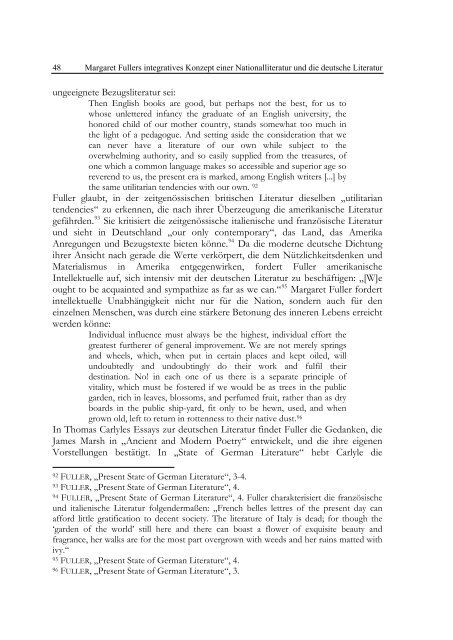Margaret Fullers transnationales Projekt : Selbstbildung, feminine ...
Margaret Fullers transnationales Projekt : Selbstbildung, feminine ...
Margaret Fullers transnationales Projekt : Selbstbildung, feminine ...
Sie wollen auch ein ePaper? Erhöhen Sie die Reichweite Ihrer Titel.
YUMPU macht aus Druck-PDFs automatisch weboptimierte ePaper, die Google liebt.
48<br />
<strong>Margaret</strong> <strong>Fullers</strong> integratives Konzept einer Nationalliteratur und die deutsche Literatur<br />
ungeeignete Bezugsliteratur sei:<br />
Then English books are good, but perhaps not the best, for us to<br />
whose unlettered infancy the graduate of an English university, the<br />
honored child of our mother country, stands somewhat too much in<br />
the light of a pedagogue. And setting aside the consideration that we<br />
can never have a literature of our own while subject to the<br />
overwhelming authority, and so easily supplied from the treasures, of<br />
one which a common language makes so accessible and superior age so<br />
reverend to us, the present era is marked, among English writers [...] by<br />
the same utilitarian tendencies with our own. 92<br />
Fuller glaubt, in der zeitgenössischen britischen Literatur dieselben „utilitarian<br />
tendencies“ zu erkennen, die nach ihrer Überzeugung die amerikanische Literatur<br />
gefährden. 93 Sie kritisiert die zeitgenössische italienische und französische Literatur<br />
und sieht in Deutschland „our only contemporary“, das Land, das Amerika<br />
Anregungen und Bezugstexte bieten könne. 94 Da die moderne deutsche Dichtung<br />
ihrer Ansicht nach gerade die Werte verkörpert, die dem Nützlichkeitsdenken und<br />
Materialismus in Amerika entgegenwirken, fordert Fuller amerikanische<br />
Intellektuelle auf, sich intensiv mit der deutschen Literatur zu beschäftigen: „[W]e<br />
ought to be acquainted and sympathize as far as we can.“ 95 <strong>Margaret</strong> Fuller fordert<br />
intellektuelle Unabhängigkeit nicht nur für die Nation, sondern auch für den<br />
einzelnen Menschen, was durch eine stärkere Betonung des inneren Lebens erreicht<br />
werden könne:<br />
Individual influence must always be the highest, individual effort the<br />
greatest furtherer of general improvement. We are not merely springs<br />
and wheels, which, when put in certain places and kept oiled, will<br />
undoubtedly and undoubtingly do their work and fulfil their<br />
destination. No! in each one of us there is a separate principle of<br />
vitality, which must be fostered if we would be as trees in the public<br />
garden, rich in leaves, blossoms, and perfumed fruit, rather than as dry<br />
boards in the public ship-yard, fit only to be hewn, used, and when<br />
grown old, left to return in rottenness to their native dust. 96<br />
In Thomas Carlyles Essays zur deutschen Literatur findet Fuller die Gedanken, die<br />
James Marsh in „Ancient and Modern Poetry“ entwickelt, und die ihre eigenen<br />
Vorstellungen bestätigt. In „State of German Literature“ hebt Carlyle die<br />
92 FULLER, „Present State of German Literature“, 3-4.<br />
93 FULLER, „Present State of German Literature“, 4.<br />
94 FULLER, „Present State of German Literature“, 4. Fuller charakterisiert die französische<br />
und italienische Literatur folgendermaßen: „French belles lettres of the present day can<br />
afford little gratification to decent society. The literature of Italy is dead; for though the<br />
‘garden of the world’ still here and there can boast a flower of exquisite beauty and<br />
fragrance, her walks are for the most part overgrown with weeds and her ruins matted with<br />
ivy.“<br />
95 FULLER, „Present State of German Literature“, 4.<br />
96 FULLER, „Present State of German Literature“, 3.

















